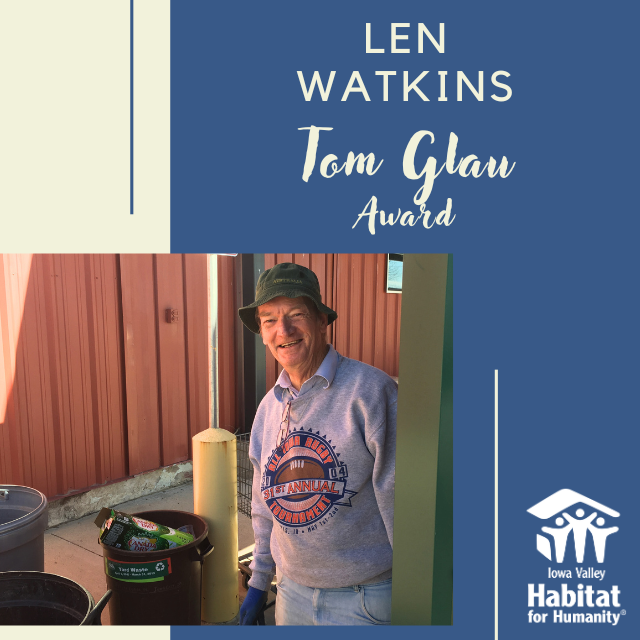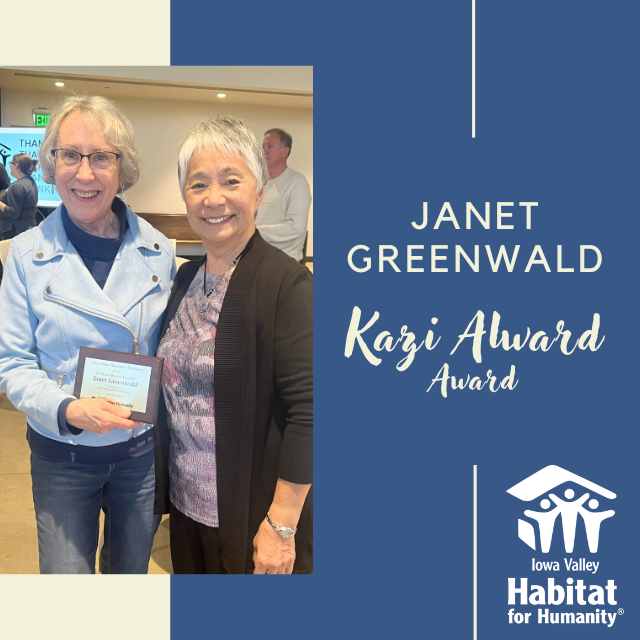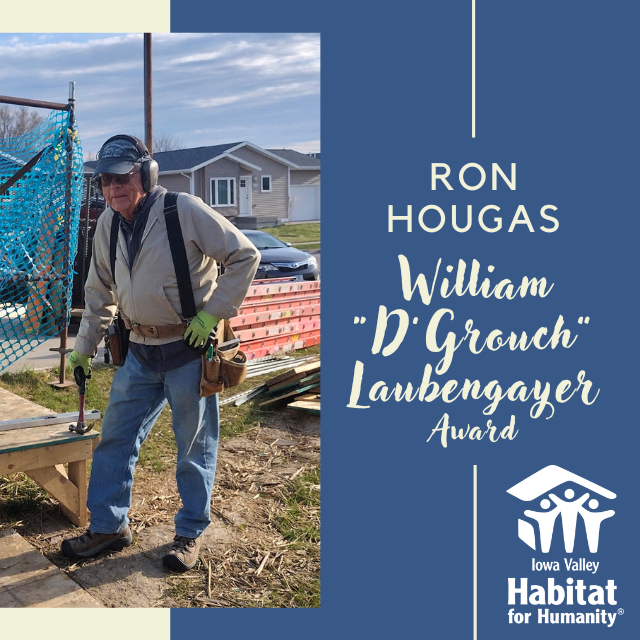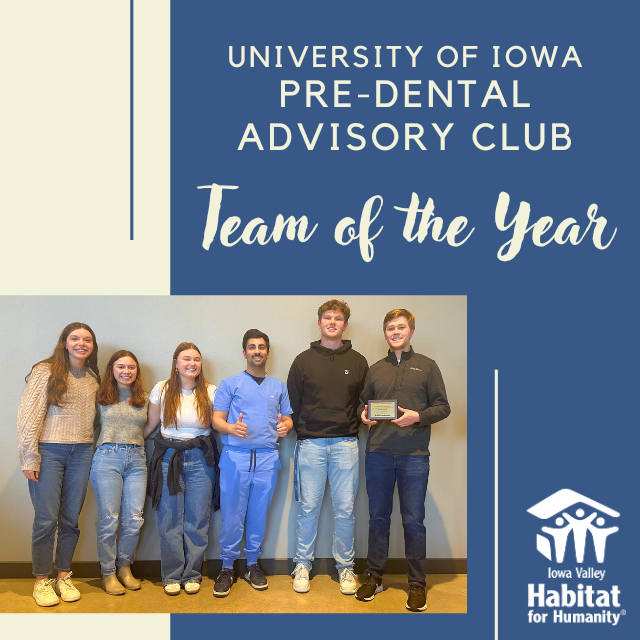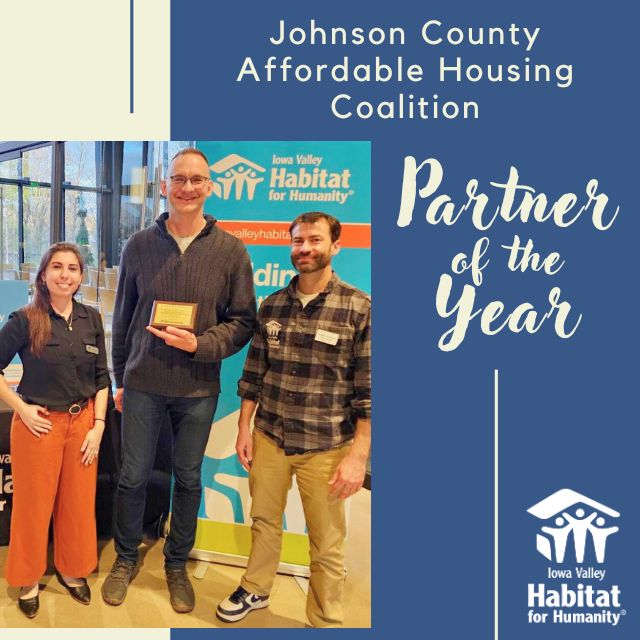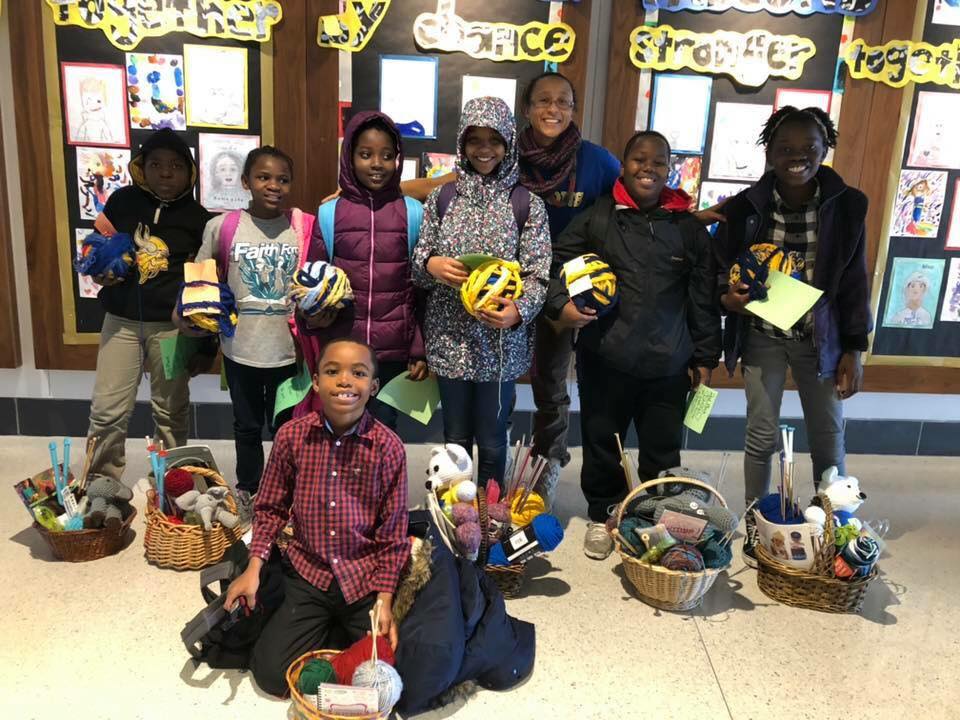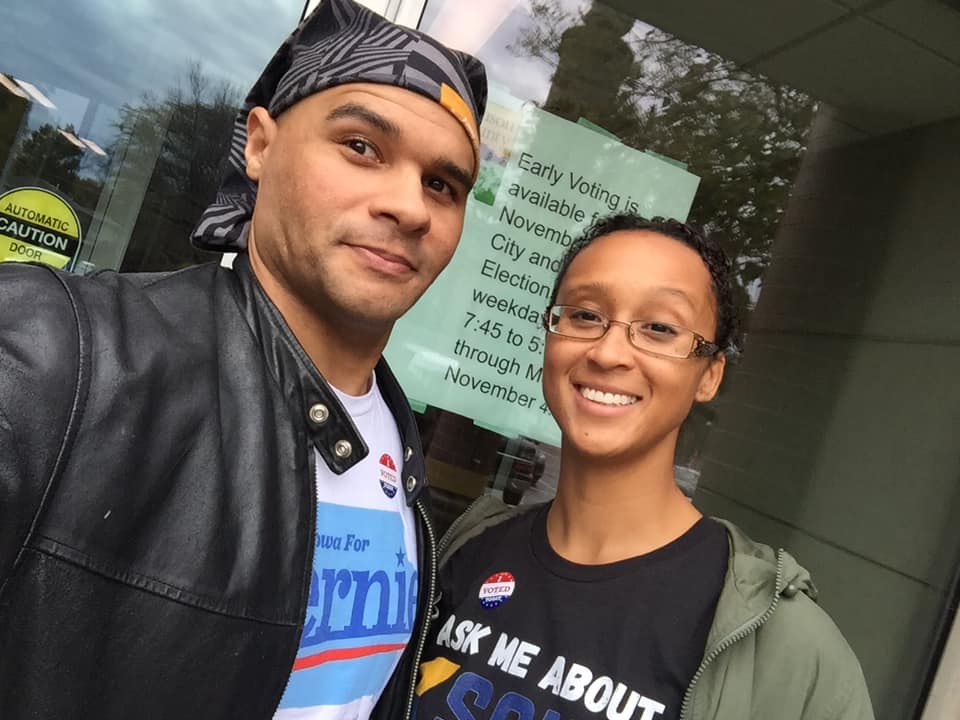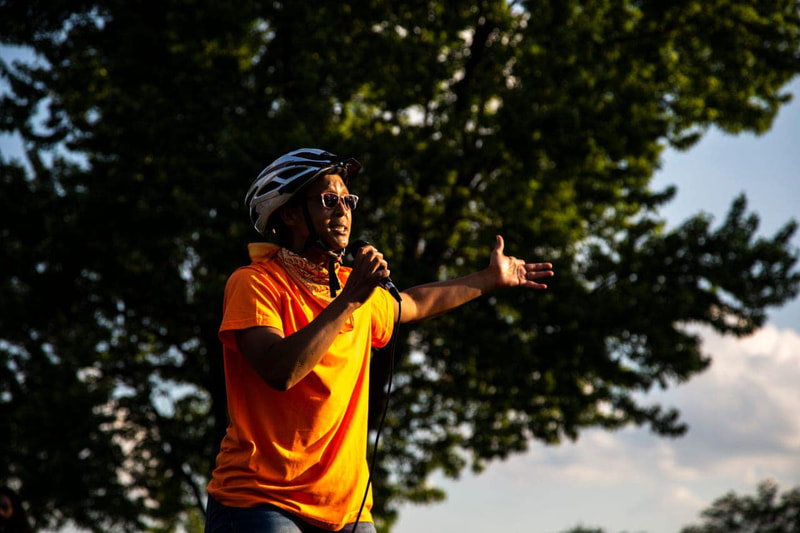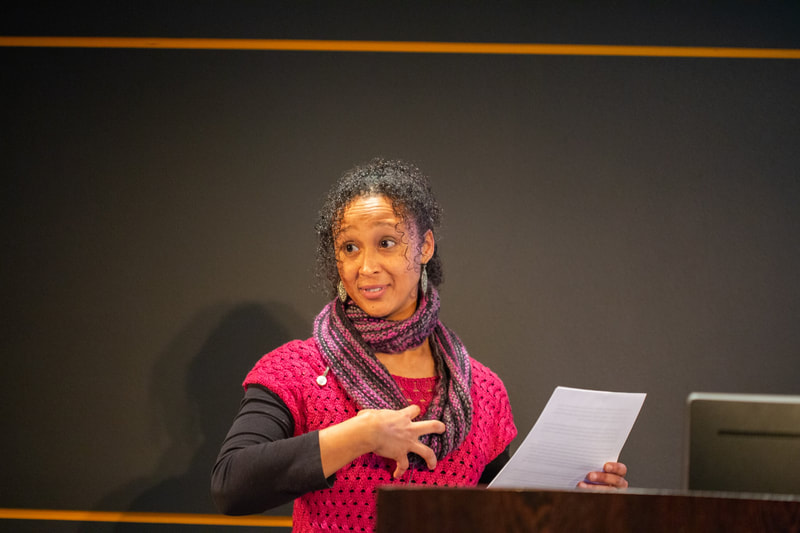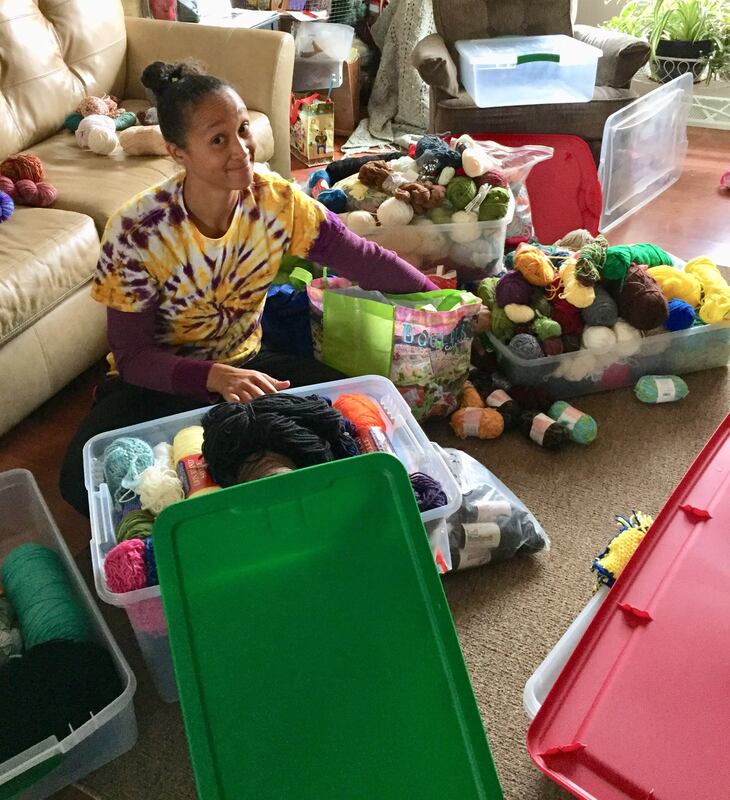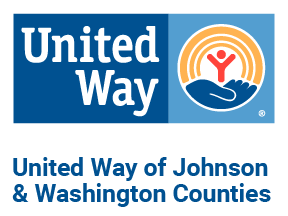|
Thank you to everyone who joined us for Habitat Friends Night earlier this month! This annual celebration of our supporters is an event our entire staff looks forward to every year because it gives us the opportunity to see many of our volunteers, donors, and homeowners. We hope this event conveys the immense gratitude we have for each and every one of you. At this event, we presented awards to several of our supporters for their outstanding service and dedication to the Habitat for Humanity mission. Congratulations and thank you to our 2024 awardees! TOM GLAU AWARD PRESENTED TO LEN WATKINSThe Tom Glau Award is named after Tom Glau, a long term volunteer for the Iowa City ReStore. Recipients are selected for their outstanding service and dedication as a ReStore volunteer. This award was presented to Len Watkins who has volunteered regularly for years helping with donations and organizing the Iowa City ReStore. Len also manages the Cans for Habitat program by sorting refundable deposit cans and bottles that are dropped off at the store. When cans are sorted and bagged up, a truckload is taken to a redemption center and the funds go toward Iowa Valley Habitat for Humanity's programs and services. Len’s support not only recycled more than 300,000 cans and bottles last year, but it also raised over $15,000 for Iowa Valley Habitat for Humanity. KAZI ALWARD AWARD PRESENTED TO JANET GREENWALDJanet Greenwald received the Kazi Alward award at Habitat Friends Night. This award is named after long term supporter, Kazi Alward, and recipients are selected for their outstanding service, kindness, and dedication. Janet volunteers on every home build and has the patience and attention to detail that truly transforms Habitat homes in the final weeks of construction. WILLIAM "D'GROUCH" LAUBENGAYER AWARD PRESENTED TO RON HOUGASThe 2024 D'Grouch award was presented to Ron Hougas. Named for William "D'Grouch" Laubengayer who volunteered countless hours on the construction of 104 Habitat homes, recipients demonstrate ongoing dedication and outstanding service to Iowa Valley Habitat for Humanity. Ron travels around 60 miles roundtrip to volunteer with the IVHFH construction crew and many times up to 3 days a week. TEAM OF THE YEAR AWARD PRESENTED TO UI PRE-DENTAL ADVISORY CLUBCongratulations to the University of Iowa College of Dentistry Pre-Dental Advisory Club for receiving the Team of the Year Award. This award recognizes the group for their outstanding and ongoing service to Iowa Valley Habitat for Humanity. The Pre-Dental Club recruits volunteers for multiple build days each school semester. PARTNER OF THE YEAR AWARD PRESENTED TO THE JOHNSON COUNTY AFFORDABLE HOUSING COALITIONIowa Valley Habitat for Humanity presented the Partner of the Year award to the Johnson County Affordable Housing Colaition in recognition of their outstanding service and commitment to prioritizing safe and affordable housing throughout the Johnson County community. JCAHC staff and volunteers work to provide the public and local housing agencies with valuable resources and education in addition to advocating for the housing rights for Johnson County residents.
Iowa Valley Habitat for Humanity was first approached by the adult children of a homeowner expressing concerns for their 83-year-old mother who lives alone in the house where she has lived her entire life. What makes this particular Helping Hands home repair request unique is that the homeowner lives on a century farm that has been in the same family for 150 years; while many small century farms are disappearing, the homeowner’s daughter told IVHFH, “… [I]t is my mom’s dream to keep the farm and the rich tradition alive that growing up on a family farm instills in family members that are impacted by family farming.” Realizing this dream on their own comes with several barriers: the old home was not designed for aging-in-place and lacks any accessibility features, and utilizing a walker in an inaccessible home has become increasingly dangerous. Worse yet, the homeowner cannot afford the repairs as she lives solely on a fixed social security income. The family even considered the worst-case scenario—selling the family home and farm to afford housing at a care facility. Facing these impossible choices, the family decided to reach out to Iowa Valley Habitat for Humanity and their Helping Hands home repair program. IVHFH was determined to help the homeowner afford the repairs and modifications necessary to continue living safely at home. As staff considered the funding needed to cover the cost of this project, they turned to a long-term partner, Oaknoll Retirement Residence. Oaknoll staff enthusiastically agreed to support IVHFH’s Helping Hands program because of its emphasis on aging-in-place work. Oaknoll’s Chief Executive Officer, Steve Roe says, “Oaknoll has supported Habitat for Humanity for many years. Helping our residents create home is what we do at Oaknoll. It has been important for us to share our resources in a way that supports others in our community to have quality, affordable housing—whether that be supporting a new Habitat build, or this year partnering with the Helping Hands project that will allow the owner to live more safely in her home.” With funding in place, IVHFH quickly got to work aiming to first address the homeowner’s most critical safety and accessibility needs. 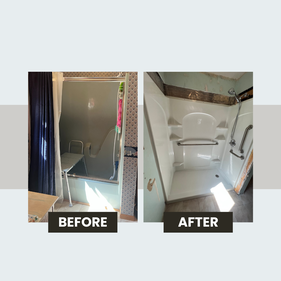 Problem (Inaccessible Bathroom): The existing shower in the home was a combination tub and shower with a sliding glass door. This made stepping into and out of the shower the most dangerous part of the homeowner’s day. In addition to the accessibility concerns in the shower, the sink and faucet were badly corroded and would likely fail soon. Helping Hands Solution: IVHFH worked with Bea Day Plumbers to replace the tub and shower with a low-clearance unit and re-level the bathroom floor. Grab bars were then installed, and the sink and faucet were replaced. IVHFH staff finished the bathroom remodel by installing new drywall and replacing the bathroom vent. 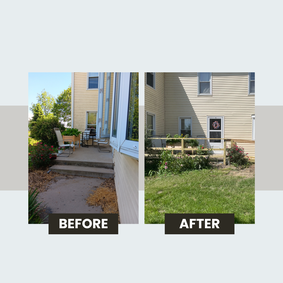 Problem (Home Entrance): No entrance to the home could be accessed without encountering steps, making the simple act of entering and exiting a perilous task. The entrance most frequently used by the homeowner opened onto a poured concrete patio space with two steps down to a sidewalk leading to the driveway. Adding to safety concerns, there were no handrails on the patio or leading down the steps. Helping Hands Solution: IVHFH constructed an accessibility ramp equipped with handrails leading from the sidewalk onto the concrete patio. Problem (Roof Damage): The roof sustained damage from a storm earlier in the year. Upon inspection, IVHFH found that part of the roof was covered with asphalt shingles several of which were missing, and others were damaged. Helping Hands Solution: IVHFH staff replaced the missing and damaged shingles to prevent further damage to the interior of the home. 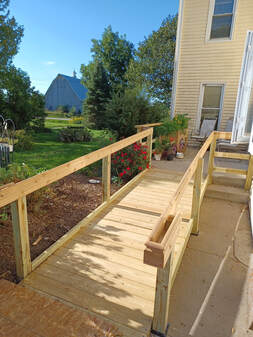 With the repairs complete, IVHFH staff recently followed up with one of the homeowner’s daughters who told IVHFH, “[My mom] ... loves it. She tells everyone that comes over, ‘You gotta see my new bathroom.’ And now she's zipping up and down that ramp like no other.” She agreed the repairs were not only critical for her mom’s safety and ability to stay on the farm that means so much to their entire family, but the repairs have eased the stress and lifted the concerns she and her sister had for their mother. She explained, “Our intent is to keep her here; this is where she wants to die, and I will do everything possible to make that happen.” The family is now one big step closer to honoring their mother’s wishes and giving her many more safe and happy years living on a farm that holds a lifetime of memories. 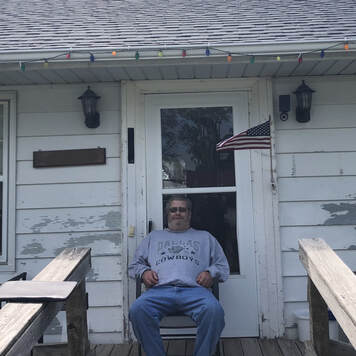 Earlier this year, Iowa Valley Habitat for Humanity was approached by a man who was experiencing more than his share of bad luck. Jim, of Lowden, IA, had been in a car accident that left him unable to work. In addition, medical concerns had him in and out of the hospital through the winter, and his home’s roof sustained catastrophic damage in last summer’s derecho. When the plaster cracked and began to fall in the dining room, he knew he needed help. Knowing that he would not be able to afford the repairs on his own, he reached out to our organization. Our Helping Hands program was able to secure grants to pay for the replacement of Jim’s roof, install some much-needed grab bars throughout the home, and arrange for weatherization improvements to the rest of his home. These repairs will help him stay in his home and ensure his continued access to decent, safe housing. Our partnerships with the Eastern Iowa Regional Housing Corporation and the US Bank Foundation and US Bank Tipton branch were instrumental to the success of this. These organizations provided the funding to pay for the labor and materials needed to get the job done. Without their commitment to the Cedar County community, homeowners like Jim would be without options. Expressing his thanks, Jim said, “I’m very thankful. God bless the people that reached out and made it possible for me to afford to get the work done.” 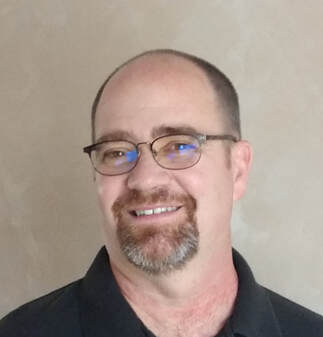 This month we are featuring Cliff Haynes for our Community Partner Spotlight. Cliff is Disaster Program Manager for The Eastern Iowa Chapter of the Red Cross. He has filled numerous roles with the Red Cross and has deployed to multiple disasters, including forest fires in Canada and Hurricane Maria in Puerto Rico. Cliff enjoys being able to assist people with recovering from disasters, whether it is a hurricane or house fire. Prior to moving to the Midwest in 2015, he was in emergency services for 20 years as a volunteer firefighter and EMT. Cliff has a wife and two children. In March 2021, The Eastern Iowa Chapter of the Red Cross partnered with Iowa Valley Habitat for Humanity and is working together with The Iowa City Fire Department to help make homes safer in the South District of Iowa City. IVHFH: Can you talk a little bit about current work of the Red Cross of Eastern Iowa on Emergency Planning and Disaster Preparedness? Cliff Haynes: The American Red Cross Disaster Cycle Services group is responsible for preparing communities for disasters, responding to the immediate needs of those affected by disasters, and helping individuals and communities affected by disaster recover successfully. Currently, the Red Cross is building partnerships with government agencies and community advocacy groups across the entire country. In the Nebraska/Iowa Region, and more specifically the southeast Iowa territory, we are partnering with school districts for youth preparedness programs, fire departments, and other community agencies for fire safety programs, and county emergency managers for disaster response planning. Our workforce is ready to respond to disasters, helping present prevention and preparedness programs, and working to make sure we are ready to serve the community if needed. IVHFH: The 2021 Iowa Region Fire Campaign was recently launched officially. What are some of the ways residents of Iowa City can be involved and participate? Cliff Haynes: Home fires are the number one disaster the Red Cross responds to. In an effort to reduce the number of fires and the number of fire deaths, we have a project entitled Home Fire Campaign. This consists of two parts. One part is “Sound the Alarm” and the other is “Homes Made Safer”. Through these two programs, we partner with various community agencies to target high fire risk homes and neighborhoods to educate the residents on making their homes safer from fire dangers. This includes fire safety education, the making and practicing of escape plans, and testing of smoke alarms. If a home does not have a smoke alarm, the Red Cross will arrange to have smoke alarms installed at no cost to the resident. Residents can go to redcross.org/smokealarmIA or call 833-422-1751 to register for the “Homes Made Safer” education and request a smoke alarm. IVHFH: The American Red Cross serving Iowa is currently running three blood donation centers. What resources are available for blood donors in Johnson County specifically? Cliff Haynes: The Blood Services division of the Red Cross has regular blood drives throughout the community. To find a Red Cross blood drive in their area, people can go to redcrossblood.org or download the Red Cross blood donor app from either the Google Play store or the Apple store. Blood donations to the Red Cross are used both locally and outside of the local area to meet any needs. A donor can even see how their blood was used to help a patient. IVHFH: “Prepare with Pedro Fire Safety”, and the “Red Cross Pillowcase Project”, are two of the most effective Red Cross Disaster Preparedness programs specially created for children K-2 and Grades 3-5. Tell us a little about these. Cliff Haynes: The Red Cross has two programs targeted towards youth preparedness, “Prepare with Pedro” and “The Pillowcase Project”. “Prepare with Pedro” is a program designed to be presented to kindergarten through second graders. It teaches the children basic safety tips for a variety of emergencies as well as some simple coping skills to help manage stress. “The Pillowcase Project” teaches youth in 3rd-5th grade fire safety skills, preparedness skills, as well as coping skills for managing stress. The students are encouraged to take what they learn in the presentations and teach it to their families to make their homes safer. IVHFH: The Red Cross is a volunteer driven organization. What are some of the current opportunities for volunteers to work on for the Red Cross in Eastern Iowa and Johnson County in particular. Cliff Haynes: 90 percent of the American Red Cross workforce is volunteer. We are always looking for people who are called to serve their neighbors. There are dozens of positions available. Many are virtual positions, so where you live isn’t a limiting factor. Individuals can volunteer in numerous areas, including Disaster Cycle Services, Blood Services, and Services to the Armed Forces. To learn more and explore areas that might be of interest, visit: www.redcross.org/volunteer/become-a-volunteer. 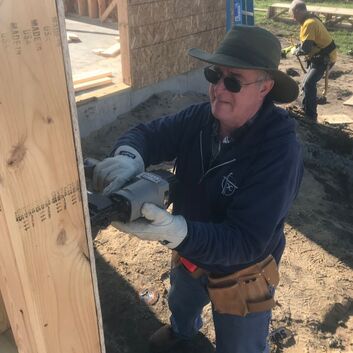 John Barr volunteers on construction of a Habitat for Humanity home. John Barr volunteers on construction of a Habitat for Humanity home. We recently had the opportunity to catch up with long-term Habitat supporter and community partner, John Barr. We came to know John through his volunteer work on construction with First Presbyterian Church. Since then, he has remained involved with our organization as a member of our Interfaith Builds committee as well as through the Consultation of Religious Communities where John currently serves as Communications Secretary. We were most excited to learn that John is a poet! IVHFH: Tell us a little bit about yourself. What is one interest/hobby that people are usually surprised to learn about you? John Barr: Composing haiku Requires concise expression From this verbose guy IVHFH: You are Professor Emeritus in Physical Therapy at St. Ambrose University, where you tenured for over twenty years, and you were a faculty member at the University of Iowa before that. What values and beliefs as a clinician, a researcher, and a professor inspired your religious community agency work, and vice-versa? John Barr: My personal values of compassion, interest in social justice, and stewardship of personal and natural resources have inspired most of my community work. IVHFH: Do you remember your first experience as a faith community advocate for social and economic justice? John Barr: One of the projects of the Servanthood Ministry at First Presbyterian Church, Iowa City, was to help address food insecurity through Table to Table and the Free Lunch Program (FLP). I was involved in fundraising for both organizations and continue to serve as a FLP volunteer. IVHFH: How would you describe the impact that had in your life, and how did that change your outlook on things? John Barr: The Free Lunch Program partnered me with a range of volunteers from other local faith communities and allowed me to directly interact with individuals who received our meals. It opened my eyes to this real need that many caring individuals in our community were also striving to meet. IVHFH: You are currently the Consultation of Religious Communities (CRC) Communications Secretary. How would you describe your current role, and what CRC programs are you working on at the moment, or planning for the near future. John Barr: The primary duties of the Communications Secretary are to oversee our Google Group network and website (www.crc-ic.org). Group members from faith communities and local service agencies/organizations receive regular notifications about social justice issues, lectures/educational programs, and volunteer needs. The CRC hopes to add a “portal” for community volunteer opportunities on our website. IVHFH: What is your favorite part of your work at the Consultation, and what is the part of your work that you least enjoy? John Barr: I do enjoy the daily ritual of sharing information via the Google Group; least enjoyable, with my limited skills, is attempting to keep our website up-to-date. IVHFH: Give us one or two more recent examples of your work with communities of faith that illustrate why interfaith dialogue is key to success for different religious communities in Johnson County. John Barr: Gabe Martin oversees the Interfaith Committee of the Iowa Valley Habitat for Humanity. Participating representatives from local Christian, Muslim, and Jewish faith communities have worked with Gabe to review national Habitat interfaith resources in order to develop a worksite orientation manual, promotional materials, and formats for devotions at worksite groundbreaking ceremonies, workdays, and dedication ceremonies. In 2019, two Interfaith Build homes were constructed on Blazing Star Drive in Iowa City, through the diligent work of hundreds of interfaith volunteers. I have had the honor of serving as the First Presbyterian Church and CRC representative for these projects which resulted in joyful outcomes. IVHFH: During these particularly challenging times, not only through COVID, but also with misinformation spread in news media, spikes in hate crime, and a growing perceived mistrust of public institutions, what can interfaith dialogue do to help bridge that social and economic divide in our communities today. John Barr: I believe that this divide is fueled by fear and lack of opportunities for members of diverse faith communities to meaningfully interact. While dialogue certainly is important to eliminating this divide, there is much to be gained through working shoulder to shoulder on community projects (e.g., Habitat home building), sharing culturally diverse meals, and together celebrating the successful completion of these projects. IVHFH: Finally, what do you find is quite unique about the faith communities in Johnson County that could inspire other religious communities all across Iowa and the Midwest? John Barr: Our organization was originally founded in the late 1960s as the Ecumenical Consultation by exclusively Christian churches in Iowa City. In 1996, at the request of faith communities other than Christian, membership was open to all faiths and we became the Consultation of Religious Communities. It is my belief that intellectual and spiritual curiosity, respect for other faith traditions, sincere concern for the welfare of members of our community, and the desire to celebrate our common accomplishments have been important motivators for our faith communities. I prayerfully envision that these and additional factors could be inspirational to faith communities throughout our country during these challenging times. Want to learn more about the Consultation of Religious Communities of Iowa City? Or interested in getting involved? Visit their website at https://www.crc-ic.org/. 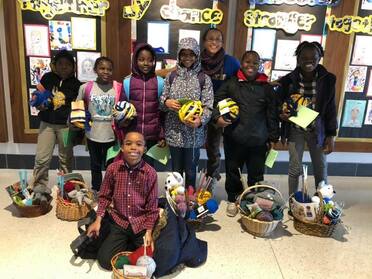 *An important disclaimer from Angie Jordan: "I speak as an individual and not on behalf of [South District Neighborhood Association] SDNA. These are MY own, individual opinions. To obtain the opinion of SDNA, questions must be submitted to our Leadership Committee for Approval."* You have heard IVHFH talking about collaboration in the South District of Iowa City and there is a lot of exciting work we cannot wait to share with you in the coming year! Through our work in the South District, we have had the privilege of getting to know South District resident, Angie Jordan. So many community organizations and groups operate successfully under the leadership of passionate and driven individuals and Angie is that leader for the South District. For the past two and a half years, Angie Jordan has started up and led efforts through the South District Neighborhood Association (SDNA) which includes the Pepperwood, South Pointe, Weatherby, and Grant Wood neighborhoods, and currently serves as the association's president. The SDNA recently became a 501(c) nonprofit in 2020 and continues connecting and engaging fellow residents in the neighborhood she proudly calls home. One surprising thing Angie shared with us, "I am not currently employed, formerly educated or trained to do neighborhood development! Everything I do in my neighborhood is 100% as an unpaid, constantly learning, volunteer-resident." Angie was born in Iowa City and attended Horace Mann Elementary; when she was eight she moved down to the Rio Grande Valley in Texas where she grew up playing many varsity sports, was involved in theater, Destination Imagination, ecology club, creative writing, Girls State, and a part of high school Rotary Interact, Pentathlon, Honor Society, Daughters of the American Revolution, along with other service organizations. Every summer she would return to Iowa to visit family and enjoy the many amazing things Iowa City had to offer for a kid, teen, and young adult. Angie went to Williams College in Massachusetts for undergraduate students and double majored in cultural anthropology and psychology with a cognitive focus. After college, through the Community Corrections Improvement Association with the 6th Judicial District, she designed and started Children of Promise Mentoring Program in Johnson County to serve youth with parents in prison. Before starting her own family, Angie would go on to be a family support advocate through the Neighborhood Centers of Johnson County and has served on the NCJC Board of Directors since 2017. Angie has been a part-time adjunct instructor at the University of Iowa for 11 years teaching Team-Building on the University’s high and low ropes challenge course. She has also been a knitting instructor for the past seven years in her small business, Banjo Knits where she has taught group and individual classes at local yarn shops and at the Senior Center. Last year, she started a new LifeTime Leisure Skills class at the University--Beginner Knitting: Mindfulness/Patience. During the past four years, she has founded and coordinated The Banjo Knits Project, an effort to increase the number of knitters in the world who practice mindfulness, patience, and kindness with themselves and others. Angie focuses this effort on underserved populations--low-income elementary schools, juvenile court services, emergency youth shelter, immigrant populations, parole and probation, and adults and children who might not be able to afford to take a knitting class in the community. She collaborates heavily with the fiber arts community in the Iowa City area. The Banjo Knits Project offers youth and adult programs, knitting support, silent auction fundraisers, and the opportunity to explore curiosity and self awareness. In the recent past, she was the Administrative Coordinator at Inside Out Reentry before resigning to become Director Household and Online School Education Coordinator to her two children due to COVID-19. She has also been the Billing Department Coordinator at a local chiropractor and worked in local retail. Her volunteer service also includes Archibald Alexander Elementary School’s Parent-Teacher Organization, a 501(c)3 nonprofit. Angie is the mother of two elementary aged kiddos who keep her on her toes, and the wife of an Iowa City Firefighter who has served for 19 years. When Angie is not working or volunteering, she loves improvisation classes, going for neighborhood leisure bike rides, getting her "swole" on, knitting, playing board games with friends and family, or gardening in her backyard. IVHFH: What originally brought you to the South District? Angie Jordan: When my life-partner and I were looking to relocate from North Liberty to Iowa City in 2015, we wanted a larger, affordable forever-home in a neighborhood with tons of established amenities to raise a family. We wanted to be in a part of town that was very familiar to both of us, where we felt safe within and able to actively engage and be a part of. We also wanted our children to attend an elementary school where they were in the majority as children of color, where we knew the teaching staff. IVHFH: As the President of the SDNA, what drives you to tackle this kind of work? Angie Jordan: It’s important to share that I do not do any of this as work, I don’t get paid for the time, energy, knowledge, or skills that I bring to SDNA efforts. I was not trained or educated or hold any titles or certifications in neighborhood development. I believe that in some cases leadership is not sought after, it is placed on certain individuals because they are biased towards doing things that have not been done before. It’s important for folks to know that for me, the neighborhood in which my family lives is an extension of our home. My life-partner and I want all the things we didn’t have and/or did have growing up that empowered us for our children. We want this in our neighborhood, in our home, so they grow up on a solid foundation knowing they’re important and valuable and know how to engage the challenges and beauty of life long after we are gone. We have a lot of “skin in the game” to consistently and sustainably engage and lift our neighborhood because it takes our investment of time, energy, knowledge, and skills and directly applies it to the future--our children. We hold a belief in our family that it takes a village to raise children. It’s important to both of us to bring our neighborhood, our home, into an awareness of the power it has and can create to be the change for a brighter future together. IVHFH: What will the SDNA be tackling in the coming weeks and months? Is there one project or event that you are most excited about or most hopeful to get done over the next year? Angie Jordan: I am most excited about the future of our brand-new neighborhood association committees. They are a step closer to ensuring initial neighborhood efforts continue and grow from within the actual neighborhood. There are many residents to engage and eager allies to integrate into the creating and maintaining of our neighborhood identity. We have only just begun to scratch the surface of what is possible for our neighborhood. And, it is important we create a framework and process that can support our big ideas while genuinely and organically connecting residents to each other to see how interconnected we are. The development of the committees allows for more folks to come together within the neighborhood, practice and learn how to be a team working towards resident-led and identified goals. The more hands, the lighter the load. The committees provide a safe space for residents to explore, develop, support, connect, and identify shared ways to dream, lead, and to get things done. I believe this will create and build trust and meaningful, lasting relationships between people who call the SD home. I am most excited about the development of our committees as their efforts will streamline actions towards goals and dreams our neighborhood has had for many, many years even before I lived here. IVHFH: 2020 has been a year that presents even more challenges for households to simply survive, and for communities to provide necessary resources. What is a major concern you have when it comes to keeping residents safe and healthy? Angie Jordan: SDNA strives to focus on building and maintaining neighborhood identity through traditions while ensuring connection to each other and to the greater Iowa City area through individual connections and advocacy. It is so important that our voices in the South District can be heard and engaged to inform decisions that surround us in local government, our schools, and in other parts of the greater community. I believe the major concern and goals of SDNA have not changed but have been amplified by 2020 and that, in short, is lifting our voices to be heard and keeping our residents informed to ensure long-lasting safety and health within our neighborhood. IVHFH: What do you think are some of the SNDA’s greatest accomplishments over this past year Angie Jordan:
IVHFH encourages you to learn more about the South District. SDNA is active on Facebook where you can stay informed and up-to-date on events that are always happening in the community. Or visit the SDNA website. |
|
|
Our Mission: Seeking to put God’s love into action, Habitat for Humanity brings people together to build homes, communities and hope.
Our Vision: A world where everyone has a decent place to live. Our Values: - Demonstrate the love of Jesus Christ. - Focus on shelter. - Advocate for affordable housing. - Promote dignity and hope. - Support sustainable and transformative development. |
We welcome all who believe that everyone needs a decent, affordable place to live. Habitat for Humanity International and its affiliated organizations do not proselytize.
Habitat will not offer assistance on the expressed or implied condition that people must either adhere to or convert to a particular faith, or listen and respond to messaging designed to induce conversion to a particular faith. |

